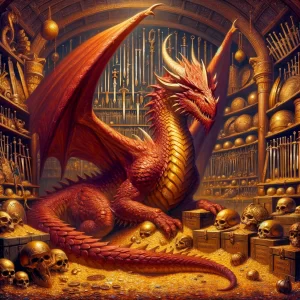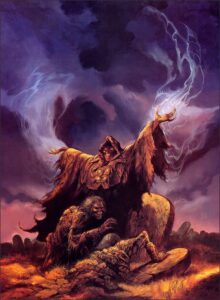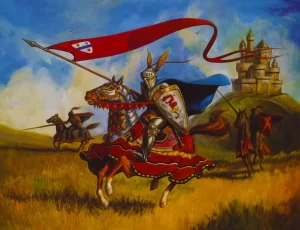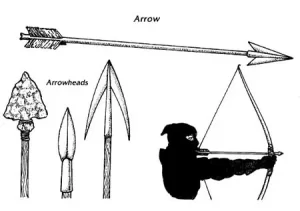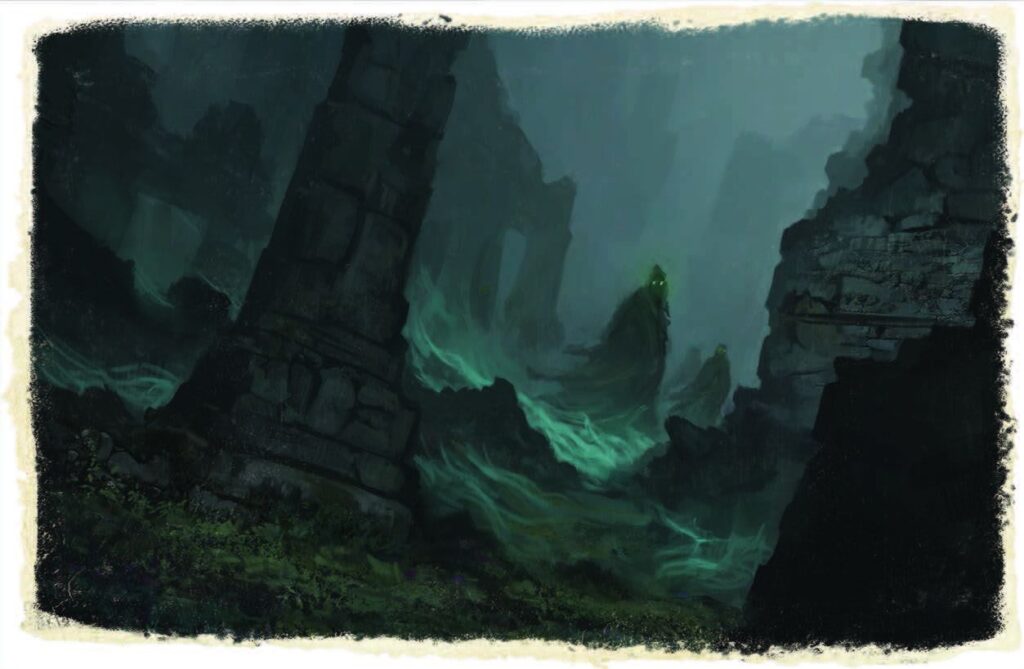
Where does the soul travel after death? To the depths of damnation? To sit by the side of the gods and feast eternally? This may be so for the truly wicked, or the exemplary heroes; the majority of mortals must however, at least for a time it would seem, wander. Most ghosts are simply the echoes of these wandering souls, drifting through the world, seldom visible, until...what? Some claim that such a ghost will pass on only when all who knew of it in life have died, others say that it must find its way through the twisting snarls of the ethereal to find its way to the afterlife. Dwarves say that when all the mountains have been ground to dust, all dwarven souls shall pass on to paradise together. Whatever the truth, the ghosts do not tell, if ever they knew it themselves.
Ghosts tend to possess the same personality traits they did in life, though it is not uncommon for their personalities to become tinged with melancholic longing for either the life they had or the release of the afterlife. Others are driven mad, consumed by the emotion of their death at the expense of all other feelings; such ghosts might appear to wear the face of a deceased loved one but, in truth, are nothing but tormented shades.
A ghost's appearance is closely tied to its emotions and its reasons for lingering. While ghosts normally resemble the living person around the time of their death, their appearance warps when under stress or when the ghost experiences strong emotions. A riled ghost (or one whose unfinished business is an angry one) might gradually morph to take on the appearance of their own violent death, becoming more and more horrifically exaggerated as the emotions grow and grow, with no physical body to restrain them. The ghost of an old man whose one regret was never confessing their love to a childhood sweetheart, being fixated on this moment, might appear almost solely as they did as a youth.
Those who died with unfinished business, were struck down in a terrible passion, or whose deaths were accompanied by a particularly resonant emotion (anger, betrayal, fear, or pain being the most common); any of these may break the natural order of things. Such traumatic instances leave an imprint on the material plane, a portion of the deceased soul's personality with all but the most prevalent emotions at the time of death dampened. The rest of the soul passes on but, tethered by the lingering fragment, is unable to rest. If the ghost is able to find closure, the fragment becomes untethered from the world and is able to rejoin the remainder to be whole and at peace.
Formed of soul essence and sheer force of will, ghosts have the ability to overpower the soul of a living creature and exist within their body. While a ghost is able to possess anyone with weaker will than itself, those with some sort of link to the ghost are easier targets: those who have acquired items the ghost owned in life, blood relatives, those who dabble in ethereal magic and, particularly, those whose lives mirror that of the ghost itself. Whatever host the ghost chooses will typically retain some sense of the ghost's character for a time after their possession, whether it be a missing piece needed to puzzle out its motivation, or a sobering sense of its relentless fury. Possession can take place over the course of months or years, with the ghost taking control so slowly the victim does not realise until it is too late, or it can be as quick a process as it is unsubtle. Rarely, a benign ghost will use this ability to directly and efficiently guide another towards fulfilling its business while leaving them in control of their actions. More commonly, malign ghosts will possess a person entirely, leaving them aware of their body's actions, but unable to do anything to stop them.
While forcibly exorcising ghosts is a possibility in areas where they have become a problem, there is always the chance of it returning after a time, adding vengeance against the banisher to its agenda. A less risky, and more permanent, solution can be fulfilling whatever business that ties it to the world. Should a ghost understand and trust a promise made to help it achieve its aims, it will probably do no harm to the promise-maker though, should they fail, or make their oath in bad faith, the ghost's attacks will surely be redoubled. If its business is completed - whether it be finding and reuniting it with its lost remains, exacting revenge upon its betrayer, or declaring love to its betrothed - even the most violent and irrational of ghosts will have a moment of clarity and calm, before fading away with the momentary knowledge that it is going on to rest.
Ghosts tend to be restricted to the area in which they died, though how far their hauntings extend can vary dramatically; a ghost may be constrained to one room, one forest clearing, or an entire moor, seemingly dependant upon the circumstances surrounding the ghost's death as well as the issue it is attempting to resolve. Rarely, ghosts haunt an individual, following them wherever they go; this is usually the case for those betrayed by a close friend or lover.
A ghost can have a variety of effects on its environment, from a simple chill in the air, a vague sense of unease, or more specific hauntings. The circumstances of a ghost's death often seep into the surrounding area; blood will ooze from the walls around a murder victim, food will appear to turn to dust around a starved child, choking ash will fill the air around one who died in a fire, and so on. These apparitions, while alarming, are usually purely spectral, harmless in nature and, for the most part, not consciously controlled by the ghost in question, instead flaring up or dying down in response to its emotional state. However, some ghosts have the power to focus these effects sufficiently to do mortals harm, as well as to control relevant objects in their environment.
Particularly willful ghosts are able to manifest items, clothing, and even simulacra of living creatures as they wish. Animals significant to the ghost's life or death commonly accompany them - most often dogs or horses. While not truly the lingering soul of an animal in actuality, these creatures behave in much the same way, except for their unwavering loyalty to the ghost in question, as manifestations of their memory and extensions of their will.

